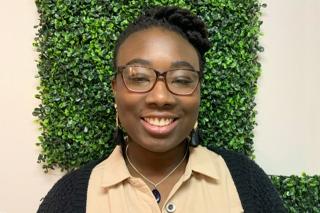Tell me about this scholarship and why you applied for it.
The Verne LaMarr Lyons Scholarship is awarded to MSW candidates interested in mental health practice and committed to working in African American communities, which is a good fit for my interests. Verne LaMarr Lyons was a social worker who addressed health concerns affecting African Americans, such as insufficient prenatal care, infant mortality, AIDS, cirrhosis, and general life expectancy.
Tell us about your experience.
Currently I work as a grant manager. I contract with various non-profits that provide sexuality education and youth development education to youth. Our priority populations are Black and Latinx youth. Before this role, I was a sexual health educator in Boston, and I worked with primarily Black and Latinx communities, so I have experience working in the Black community.
I have always wanted to do counseling, but I wasn't sure what specific field of counseling I wanted to practice. Learning about Simmons' program really drew my attention and I thought the opportunity to be a school counselor, would be the perfect position for me because I could still work with young people and provide direct counseling to them.
Why did you decide to attend Simmons?
I really like that it's the first School of Social Work in the nation. Simmons also has a history of building up women to be strong leaders in the community. I thought this would be a great place to cultivate my leadership and also connect with students and experienced faculty who have been in the field. Also, Simmons clinical simulation program seems amazing and I'm excited to have a safe environment to practice in before working in the community.
What do you envision yourself doing after graduation?
I want to be a school counselor, because I think counselors can play a pivotal role in helping to end the school to prison pipeline, which disproportionately affects Black and Latinx youth. What happens is that these students are over-disciplined in school and that sets them on the path that pushes them out of the classroom and into the prison system. Even in Boston we see that Black and Latinx students are more likely to be disciplined in school, with detention and suspension, in comparison to white students. I am interested in working with students of color to help be a bridge between them, their teacher, their family, and other institutions with which they may be involved to build a support system to care to help them thrive in and out of school. There are a number of complex reasons why students may act out in the classroom, and a school counselor can intervene and bring restorative practices for our students instead of disciplinary practices.
Do you have any advice for prospective social work students?
It's ok not to know the specific track that you want to do, but knowing your “why” is important. Take the opportunity to talk to people who are in the field. Talking to professors is also helpful in narrowing down your decision. Stay open to changing your mind.

